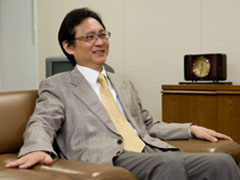Interview【JICA-RI Focus Vol.2】Interview with Director Keiichi Tsunekawa, Part II
2009.04.20

The JICA Research Institute (JICA-RI) was established on October 1, 2008. Through interviews and reports, this column - JICA-RI Focus - will acquaint the reader with the institute’s international cooperation and development research activities.
Volume II of JICA-RI Focus explores the personal research style of JICA-RI Director Dr. Keiichi Tsunekawa and the research style of the new institute as an organization.
What triggered your interest in developing countries? What has been your most memorable research so far?
I enrolled in university in 1966. It was in the middle of Japan’s high economic growth era when this country finally emerged from its pre-occupation with post-World War II turmoil to realize that there are poorer countries in the world. North-South and Asia-Africa issues were gaining attention, and I found myself intrigued by the southern countries. I probably had a naive sense of justice as a young man, too. I wrote a graduation thesis about Latin America, partly because I liked speaking Spanish with the rolling tongue. I even picked Fidel Castro’s political transition as my Master dissertation topic.
Studying the metamorphosis of Castro, from a young populist into a one-party fascist, I realized that Cuba’s political movements were linked to the failure of its economic growth mode, a breakdown which might be said to summarize the situation of the entire Latin America region. This is what prompted me to establish my field as political economics.
What are your plans for supporting your researchers? What kind of career path do you foresee for the young researchers at this institute?
There are two kinds of young researchers: 1) those who have been active in academia, and 2) those who have gained practical experience in the field. The former are capable of writing persuasive papers and formulating positions distinct from the opinions of others. The latter are knowledgeable about specifics and able to point out weaknesses in the explanations offered by conventional theories.
The risk is that researchers with predominantly academic backgrounds will base their conclusions on theoretical factors, possibly overlooking important aspects of complex phenomena. To avoid this risk, it will be useful for them to visit the field often and work with practitioner colleagues. At the same time, it is important for researchers with practical backgrounds to refrain from unduly generalizing their experience. They should understand the importance of finding objective patterns by putting individual experiences in the context of multiple cases and prior studies.
Many are fast learners who can quickly understand what is required so that researchers of both types can influence each other positively in the process of generating synergy.
What kind of research methods and styles do you plan to establish?
Our research will be based on numerical analysis and comparative case analysis, although there could be some research that further explores particular cases. Numerical analysis allows close examination. But development has many unquantifiable aspects and forced quantification could distort the truth; therefore, qualitative analysis will not be overlooked.
Despite its size, JICA-RI is a jack-of-all-trades and has a vast array of research topics; thus, cooperation with other organizations is imperative. We believe that by facilitating joint studies yet taking the initiative, we can promote and publicize our institute’s work.
What would be your words of advice for young researchers, university graduates and graduate students?
We had the tragic experience of losing a selfless aid worker in Afghanistan in August. I am proud that people like him, dedicated Japanese, are engaged in international cooperation worldwide. It would be greatly regrettable for them if we were unable to conduct field research.
I worked at a university until August this year and don’t have practical experiences myself. But at JICA-RI I would like to promote field-oriented research while still retaining the academic.

事業事前評価表(地球規模課題対応国際科学技術協力(SATREPS)).国際協力機構 地球環境部 . 防災第一チーム. 1.案件名.国 名: フィリピン共和国.

事業事前評価表(地球規模課題対応国際科学技術協力(SATREPS)).国際協力機構 地球環境部 . 防災第一チーム. 1.案件名.国 名: フィリピン共和国.

事業事前評価表(地球規模課題対応国際科学技術協力(SATREPS)).国際協力機構 地球環境部 . 防災第一チーム. 1.案件名.国 名: フィリピン共和国.

事業事前評価表(地球規模課題対応国際科学技術協力(SATREPS)).国際協力機構 地球環境部 . 防災第一チーム. 1.案件名.国 名: フィリピン共和国.

事業事前評価表(地球規模課題対応国際科学技術協力(SATREPS)).国際協力機構 地球環境部 . 防災第一チーム. 1.案件名.国 名: フィリピン共和国.
scroll